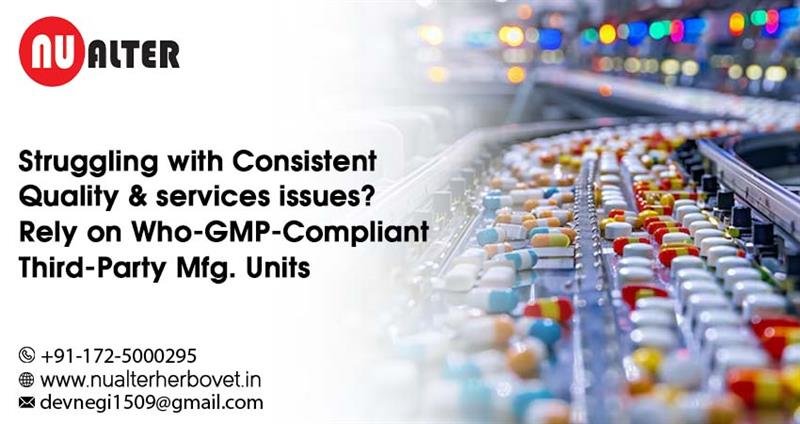Struggling with Consistent Quality & Services Issues? → Rely on Who-GMP-Compliant Third-Party Mfg. Units
For the pharmaceutical industry consistency is not optional, it is a necessity. Some of the issues that businesses face include the lack of uniform product quality, delays in the provision of services, and possible jeopardizing compliance. Such problems may cause issues with a brand's reputation and erode the trust of health professionals. This blog aims to showcase the reasoning behind the decision to outsource to a WHO-GMP compliant Pharma Third Party Manufacturer. The focus will be on compliance and outsourcing benefits, and how to choose the right outsourcing partner.
What WHO-GMP Means in Pharma
- WHO-GMP= World Health Organization Good Manufacturing Practices.
- Establishes international quality and safety standards.
- Focuses on clean and controlled production environment.
- Ensures that medicines are manufactured consistently, safely and generate effectiveness.
- Decreases the risk for contamination or failure of the product.
Key Issues Faced Without Compliance
- Product rejections.
- Inconsistent batch quality.
- Delivery of orders overdue.
- Penalties from regulatory bodies.
- Unsafe transport and storage.
- Operational costs are high.
- Exports become limited.
- Brand reputation is poor.
Benefits of Choosing WHO-GMP Pharma Third Party Manufacturer
- Quality standards are guaranteed.
- Deliveries are dependable and punctual.
- Trained and skilled personnel for every procedure are in place.
- Production units are safe and clean.
- Lower the chances of products being recalled.
- Enhanced customer trust.
- Operations can be scaled easily.
- Access to international markets is easier.
- Increased customer trust.
Services Offered by Them
- Tablets and capsules
- Beta-lactam and Non- Beta lactam formulations
- Oral syrups and suspensions
- Dry powders and granules
- Formulations for veterinary & poultry use
- Customized formulations by request
- Packing and labeling
- Regulatory documentation
How It Supports Business Growth
- Production problems are a distraction of the past.
- The product range expands quickly.
- Brand reliability is established as consistent supply is guaranteed.
- Increased risk financing of in-house units is eliminated.
- Helps new pharma companies expand more quickly
Factors to Check before Partnering
- Review the span of time and experience in pharmaceutical manufacturing.
- Confirm the punctuality of the deliveries.
- Analyze the costs in comparison to the pricing.
- Identify the availability of research and development, and formulation support.
- Analyze the standard of their infrastructure and equipment.
- Review the manpower and the standard of their workforce.
- Analyze the reputation of the client, and their feedback.
WHO-GMP Vs Non-Compliant Units
| Features | WHO-GMP Units | Non-Compliant Units |
| Quality Standards | Global benchmarks met | Inconsistent quality |
| Approvals | Faster, easier approvals | Frequent rejections |
| Safety Measures | Strict hygiene practices | Unsafe handling |
| Documentation | Accurate and complete | Often missing or weak |
| Market Reach | Global + local markets | Limited to local supply |
| Risk of Recalls | Very low | High risk |
Why Small and Mid-Sized Companies Prefer Outsourcing
- Eliminates upfront investment.
- Provides expertise.
- Faster market entry.
- Lowers compliance stress.
- Facilitates competitive pricing.
Conclusion
Working with Pharma Third Party Manufacturer certifies compliance with WHO-GMP safety standards, and assures continual supply. Nualter Herbovet is a dedicated team of professionals with experience in marketing, sales and manufacturing, in both the pharmaceutical and veterinary sectors. We aim for the highest quality standards, for which we have advanced facilities with ISO, GMP and WHO GMP certification.
FAQs
Q1. What is a Pharma Third Party Manufacturer?
A company that manufactures medicines for other pharma companies.
Q2. The importance of WHO GMP Certification?
It shows that the company meets global quality and safety requirements.
Q3. What services do third-party units provide?
Formulation, manufacturing, packaging, and documentation. Q4. How does outsourcing reduce risks? By providing quality, compliant, timely deliveries, and relieving heavy investments.



